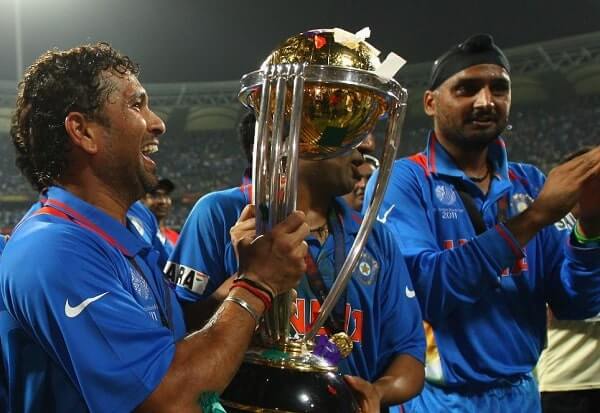The year is 2011, and it’s the tenth ICC World Cup, co-hosted by India, Sri Lanka and Bangladesh. It’s the first to be held since the inaugural IPL in 2008, and the official ambassador for the tournament is Sachin Tendulkar: the 37 year-old is playing in his sixth and final World Cup, having made his debut in the 1992 edition. Expectations are high in the main host country, after the 2007 tournament in which India was eliminated in the group stage.
A fast start v Bangladesh
The first match of the tournament is between co-hosts, India and Bangladesh. It’s a bloodbath; India amass 370/4, with Virender Sehwag blasting 175, and 100* to up-and-coming batter making his World Cup debut – Virat Kohli.
In reply, Bangladesh manage a respectable 283/9, having been 3/234 at one stage. But it’s still a huge win for India; quiet and understated seamer Munaf Patel is the pick of the bowlers with 4/48, India managing some belated revenge after defeat at the hands of Bangladesh four years ago.
A tied affair v England
India’s second match in Group B is against England, and this time it’s Sehwag’s opening partner, Sachin Tendulkar, who anchors India’s innings with 120 in a total of 338. 29 year-old James Anderson narrowly misses out on a century, scoring 91 – but unfortunately with the ball.
England don’t give up – and led from the front by Andrew Strauss (158), England score 13 in the last over to tie the game. It’s the era before boundary countbacks and super overs, so there’s no victor; each team claims 1 point from the match.
A late setback v South Africa
After comfortable wins against Ireland and the Netherlands, India faces its toughest test of the tournament so far: a formidable South African side, littered with all-time greats including Amla, Smith, Kallis, de Villiers, du Plessis, Morkel and Steyn.
Undeterred, India’s top order combine to set up an enormous platform of 1/267, led once again by Tendulkar (111), Sehwag (73) and Gambhir (69). But the middle order collapses, and India lose an unforgivable 9/29 in the last 9 overs to finish on 296, Steyn picking up 5/50. It’s not quite enough to defend, with South Africa sneaking home with 3 balls to spare and handing India its first loss of the tournament and ultimately sealing South Africa’s position atop Group B.
Quarter final v Australia
It’s a match no one expected so early on, but with Australia qualifying third in Group A, India suddenly found themselves facing the three-time defending champions, who had played in every single final since 1996.
Australia are restricted to 260/6, courtesy primarily of Ricky Ponting’s 104. For India, Yuvraj Singh continues his excellent form, taking 2/44 with the ball and then scoring 57*, with fifties also to Tendulkar and Gambhir, taking India home in a tense chase. Australia are defeated, and suddenly the tournament is wide open.
A match worthy of a final v Pakistan
In 2007, India and Pakistan didn’t meet, and
in 2011, the neighbours played in separate groups.
It’s no surprise that the semi-final between India and Pakistan at Mohali is the most anticipated World Cup match in recent memory.
The evergreen Tendulkar scores 85 in pursuit of his 100th international century, but is dropped four times in the process, and India scrape to 260 – a middling score. For once, Yuvraj Singh fails, departing for a golden duck to Wahab Riaz, who breathed fire to claim 5/46.
But India have saved their best fielding and team bowling performance of the tournament for this moment; each of India’s five bowlers takes 2 wickets, Munaf Patel the pick of them with 2/40.
History v Sri Lanka
2 April 2011, Wankhede Stadium, Mumbai, India v Sri Lanka. It’s India’s best chance to win a World Cup in decades.
It’s Tendulkar’s home ground, but there was another great who shone brightest – Mahela Jayawardene caressed 103* off 88 to take Sri Lanka to 274/6. It’s a huge total; no team has ever successfully chased above 250 in a World Cup final.
The task gets immediately harder when Sehwag departs for 0, and Tendulkar is dismissed soon after for 18. When Kohli is spectacularly caught and bowled by Dilshan for 35, India’s hopes hang by a thread.
But in a surprise move, MS Dhoni, in lacklustre form, elevates himself up the order and forges a 109-run partnership with Gautam Gambhir (97). When Gambhir is dismissed and India’s tournament talisman Yuvraj Singh first takes guard, India still need 52 runs.
Dhoni doesn’t blink; he accelerates. He launches a six down the ground to win the trophy, and it quickly becomes the most replayed cricketing moment of all time.
The stands erupt. The dressing room exults. Shastri and Lloyd wax lyrical on air.
But Dhoni remains frozen in time, as does his shot to this day.
READ ALSO: ICC Cricket World Cup 2023: Rampant England primed for more glory






